Loyal reader “Lyn” contacted Twelve Mile Circle a few weeks ago. With it came a stack of digital images from a recent road trip to California’s Salton Sea. This has long been on my list of places I’d love to see some day, and I still hope that will happen. So I certainly enjoyed and appreciated the photos. These pictures plus the text I’ve created around them will have to keep me content for now. Even so, I hope to visit the Salton Sea in person someday.
Lyn also contributed to 12MC previously. I mentioned getting a web hit from Cameroon awhile ago. Yes, Lyn did that too while in Douala at the time, and knew I’d appreciate the ping.
I’m fortunate to add Lyn to the very selective list of 12MC readers who have provided material that became full articles. All photographs belong to Lyn and are used with permission.
Salton Sea
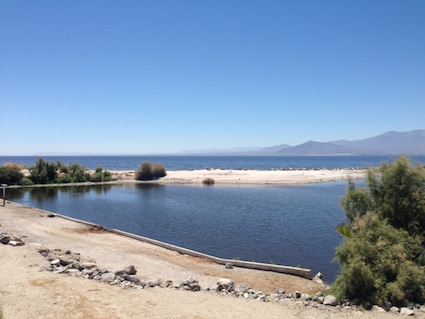
According to the Salton Sea History Museum, this geographic feature remained an extension of the Gulf of California until about four million years ago. Over time, the Colorado River washed enough silt downstream to cut the tip off from the Gulf. This left behind a large, deep depression now known as the Salton Sink.
The floor of the empty sink extends far below sea level, down to -226 feet (-69 metres). By comparison Death Valley — the lowest spot in North America — measures -282 ft (-86 m). So the Salton Sink compared rather favorably as the second lowest spot on the continent.
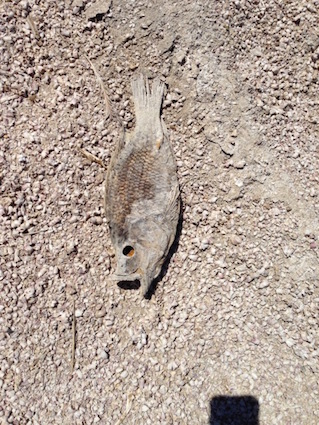
An accident caused the Salton Sea so it’s an artificial creation. People diverted the Colorado River to irrigate parts of the sink because it sat in a desert. As a result, sometime around the turn of the previous century, the area blossomed with fertile cropland. However, the river busted from its man-made diversion in 1905 after it ran higher than usual. Then it flooded uncontrollably into the sink and filled it like a bathtub.
Engineers tried to halt the breach for two years and failed. By then the spill grew 35 miles long and 15 miles wide (56 km X 24 km) within the depression, and formed the Salton Sea.
This happened in and endorheic basin without any outlet to the ocean. So the salinity increased over time and it continues to increase. This makes it difficult for the few fish species that survived there to thrive in ever worsening conditions.
Bombay Beach
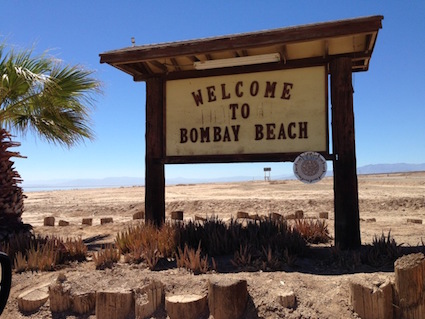
That naturally brought up a legitimate point. Why would 12MC, or anyone for that matter, want to experience the Salton Sea in person? I supposed it had to be because every description I’ve ever seen of the few settlements still clinging to its shores undoubtedly referenced the phrase “post-apocalyptic” (e.g., Salton Sea: From Relaxing Resort to Skeleton-Filled Wasteland).
Development did not unfold as planned even though the Salton Sea held so much promise after its accidental creation. In the early days, water remained fresh until the salt built up and poisonous farm runoff added to the disaster. People envisioned Bombay Beach as an inland resort, a beachfront paradise, and constructed it in such a manner.
Today it’s mostly a ruin. It’s a desolate place strewn with graffiti and abandoned junk in the searing Sonoran Desert. It sits by a fetid saline lake, a photographer’s paradise and an oddball’s dream. A handful of outcasts still live among the detritus adding character to the scene. Now does it make sense?
Slab City
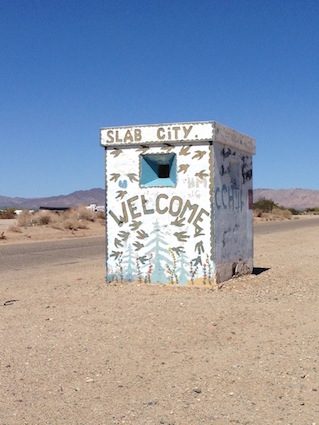
Harsh conditions created strange situations out there on the fringes of society. Slab City started as a marine corps training facility during the Second World War: Camp Dunlap they called it. However, marines did not need remote camps in the middle of the desert after the war. So the government closed Camp Dunlap, dismantled it, and left behind only the slabs of cement foundations.
Then seasonal campers in large recreational vehicles learned about the wide selection of perfectly level concrete slabs. They figured a favorable wintertime climate made this a particularly attractive spot to park for a few months every year. Slab City came without amenities, however people remained there as long as they wanted for free. “And now thousands of visitors return to ‘The Slabs’ each winter.”
Salvation Mountain
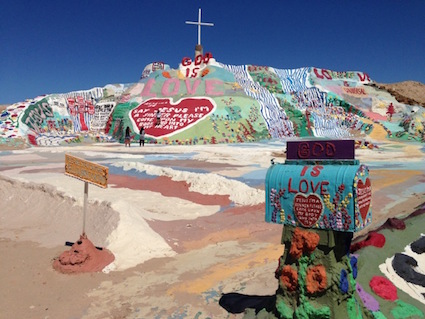
I couldn’t be sure if the isolation created unique behaviors or if people with those traits saw the Salton Sea as a beacon and arrived there from elsewhere. Maybe a little bit of both. Either way, this provided a perfect backdrop for something as wonderful as Salvation Mountain by Leonard Knight (1931–2014).
“Leonard’s passion has lovingly created this brilliant ‘outsider art’ masterpiece resplendent with not only biblical and religious scripture such as the Lord’s Prayer, John 3:16, and the Sinner’s Prayer, but also including flowers, trees, waterfalls, suns, bluebirds, and many other fascinating and colorful objects… Its 50 foot height and 150 foot breadth is made totally of local adobe clay and donated paint and is truly unique in the United States and probably the world.”
I barely scratched the surface of the Salton Sea’s weirdness or Lyn’s collection of photographs. I need to save a few surprises for later in case I ever make it out there.

Leave a Reply